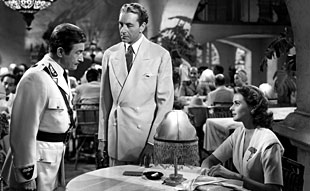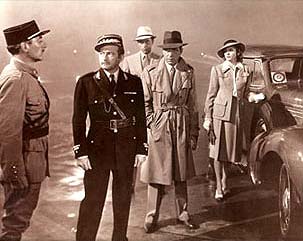June 28, 2006
on Leadership - negotiating the RTFM into the realm of forgotten schoolyard jokes
Yesterday, I claimed that leadership in tech teams is more or less down to one thing -- communication. That is the one huge gaping hole in our skills. Now, there are certainly other holes, and deep students of leadership (have you read the Kotter articles yet?) will point them out. My claim here is that the comms hole is so big in tech teams that if you fill that you'll be a happy little vegemite; if you fill any other hole, you'll be justing sucking on salt.
Bang for buck, it is communication that will give you the biggest return on investment. You can see some efforts over at Mozo where Mitchell posts on 8 sessions with staff seeking some understanding at mission. Why? She is seeking to reduce the surface area of the discussions at hand. To do that, she has to get everyone on board; first with the things that Mozilla must do, and then on the things that Mozilla thinks it should do. Bit by bit.
Communication in tech teams however goes way way beyond corporate mission statements.
In essence we as leaders have to unwind the RTFM factor. A leader has to know how to deal with the deep-seated needs of tech people and how to acquire and transmit the information needed for all the people to contribute. The way to deal with this is a little known skill and science called negotiation.
So let's talk about that. First, definition. What is negotiation?
Negotiation is the reaching of agreement, where before there was none, by means of dialogue and communication.
How often do you negotiate? Much more than you think. In fact, almost all difficult discussion falls under the rubic of negotiation. Negotiation occurs whenever there is an issue of contention. It happens when you buy a house, marry, discipline a child, choose a school, pick a restaraunt, ask your boss for help, as well as buying an orange at a fruit market.

Do you disagree? Then we must negotiate. If we do agree on this point, it was an easy negotiation, and maybe you can save yourself the bother of reading further.
Most people think of negotiation as something that happens rarely, when buying something with an uncertain price tag, or trying to get a raise in your job. That is a mistake; negotiation is the process that occurs whenever there is some form of dispute or disagreement that is resolved by discussion.
Most people don't ever get a chance to learn it properly, and pick it up as they go along. For this reason, most people make terrible negotiators. There are a very few naturals, but for the most part, only learning some home truths will set you on the path to real negotiation. There is only one large group in society that has negotiation beaten into them, and they are *not* represented well in the techie field.
So I will ignore them for now, and thrust on. Let's talk negotiation. Let's negotiate some serious talk.

Negotiation divides into two halves: win-win and win-lose. Win-win sits in contrast with win-lose. The two do not go together, and much of ones basic skill is in knowing when each is appropriate, how to move between the two, and stick with the appropriate one. Today's post is really about win-win -- explaining the much over-hyped and misunderstood term of win-win.
The basic principle behind the separation of negotiation into these two components is known as The Prisoners' Dilemma. In this simple problem, two people have to cooperate, but the problem is such that if one of them cheats, that cheater earns a larger payoff.
| Who wins? | I lose | I win |
|---|---|---|
| You lose | (failure) | win-lose |
| You Win | win-lose | win-win |
The Prisoner's Dilemma is a game from economics. Do not be scared by this, it is a very simple game, with some wonderful and thought provoking results that explain many complexities in your day to day life. Understanding this game will payoff in many ways -- the first of which is why Frank's suggestion of Reciprocity works!
This problem is a dilemma, because the total payout if we cooperate is higher, but the individual payout if one can successfully cheat is higher for the cheater. Do we cooperate or do we cheat? (These tables will be better on the HTML - click the link). But if we both cheat, we both lose big time.
| Payouts: yours / mine | I cheat | I cooperate |
|---|---|---|
| You cheat | -10 / -10 | 10 / -20 |
| You cooperate | -20 / 10 | 5 / 5 |
In the above table, see how if only one of us cheats, the payout for the cheater is high, but the cooperator is punished badly! If we both cooperate, we get less each, but we are both in the positive.
Now add the numbers together - the sum for both of us cooperating is 10, and all of the others squares are summed to much less. So, as a group, we are better off cooperating, and individually, we are better off cheating, but making sure the other does not cheat. Are we saying that we need to cheat, but stop the other person cheating?

Sounds like real life, right?
Classically, we talk about two accused crooks brought in for questioning by the police -- they are the two prisoners in the dilemma. If both of them keep quiet, then both walk, as there is no real evidence of the crime. If one of them blabs, then the other goes to jail for a long time because he also lied, while the blabber gets off lightly for turning evidence. The question is, for you as a crook, how do you stop the other guy blabbing?
What can we do to try and reach the best payoff? How can our two crooks stay out of jail? These are the central questions of negotiation - once answered, they allow a selection of tactics and process that helps achieve the best payoff.
Before we can achieve the best payoff, we must know in which square of the Prisoner's Dilemma we find ourselves. Let's imagine we have decided to go for a group benefit -- the common good. How do two crooks ensure that neither blabs?
Several ways! They could work together and establish trust, by doing lots of heists, one after the other. Alternatively, the two crooks could employ revenge - if Joe blabs and Fred goes to jail, Joe will find the mob chasing him later on. This expands the basic game into a more complex form of game involving external payoffs. Another way is to establish trust via bonds. Maybe marry each other's sister, or owe each other a bounty?

The key then is to create an external context and to add something else to the game. In the first suggestion above, the two crooks expect to do many jobs in the future. So, their combined payoff in the future depends on doing many jobs together, and they can only do that if they keep together as a team. In the second suggestion, they add a future punishment, so that the rules of the game, and the consequent payoffs, are modified to ensure the cheater loses his incentive (see Stag hunt). Finally, they create Family - which is an extended, powerful relationship. Just like a company, or a tribe, or a football team, our two crooks can bond together in a group that carries them past today's challenges.
In simple terms, they can change the payoffs. The more complex solution is to make the game a repeating game. That is, to make each dilemma one of many, so that each cheating payoff has to balance the loss of potential future shared benefits.
And, that is the key to understanding whether one is in a win-win scenario or a win-lose scenario:
Is this the only time we negotiate? Is this the end of the game? Is there another round?

If there is more to come, then you are, basically, in a win-win negotiation session. If there is no more to come, then you are in win-lose.
That's the first and most basic lesson of negotiation.
Am I in win-win or win-lose?
You must ask yourself this question so frequently it becomes second nature. And, this question is often the same as asking
Is this the only time we negotiate, or do we have a future?
As much second nature is your assessment as to whether you, or your negotiating partner, is considering the future or not.
From here, the world forks. You go to either the relationship process of win-win or, you go to the best payoff of win-lose.
Which are you in? If it is not obvious, you will find out if I post again.
Posted by iang at June 28, 2006 05:34 PM | TrackBackin past life they sent my wife to executive training school (a couple times, level I executive, level II executive, etc; something typically found in large corporations).
they give Myers-Briggs personality tests and talked about different personality types frequently communicate differently and also frequently have different motivations and goals.
they also do things like break-up into teams and play games that involve win/win and win/loose strategies .... i.e. typically to learn about leaning towards win/win ... since it can provide best long term outcome.
however, my wife had her team play win/win up until the very last round ... and on the last round played win/loose. this nearly brought some grown men on the other team to tears complaining that she played unfair. part of the issue is that if it really is the last round ... it is possible to play win/loose and not worry about long term consequences. however, in real-life, there frequently is no definitive "conclusion", so playing win/loose (in real life) may result in long-term adverse consequences.
some people that are in the habit of playing win/loose ... may also be found to use cliches like "that is water under the bridge" ... in attempt to wipe the slate clean each time.
for even further drift there is always Boyd's talk on "Organic Design for Command and Control" ... where he eventually gets around to asserting that the preferred terms should be Leadership and Appreciation.
this is 1987 version
http://www.belisarius.com/modern_business_strategy/boyd/organic_design/organic_design_frameset.htm
I had sponsored him at seminars in the early 80s and still have one of the original versions (hard copy) of the talk along with some number of subsequent versions as this particular talk evolved.
my past posts mentioning Boyd
http://www.garlic.com/~lynn/subboyd.html#boyd
and misc. URLs from the around the web about Boyd, OODA-loops and/or other Boyd-related topics
http://www.garlic.com/~lynn/subboyd.html#boyd2
I also did Myers-Briggs, found it interesting but not particularly useful. Yes, it tells you there are different people out there, but nothing much more. Possibly, as you suggest, we should have taken it further.
Negotiation games are good -- but I'd caution against playing them to win. It is a good exercise, and a shocker to some, but the game emotions can spill out into real life. Some people can be seriously effected by them, and carry the scars to outside game time. Otoh, some people need to also be taught that lesson, that there are no games in real life :) There is a game called diplomacy that brings this out.
Posted by: Iang at June 30, 2006 07:01 AMUnfortunately, the bonds of the social network are notoriusly difficult to escape. Most people (even known criminals) are very cooperative and honest within their established relationships. Outside of it, all bets are off.
People instinctively divide the rest of the world into "those, who matter" and those, who don't. It is not necessarily clear-cut and there may be a ranking, but when confronted with the choice, most people make up their minds pretty quickly.
"You don't matter" and "I don't trust you" go hand-in-hand and cannot be overcome by the effort of one of the sides.
In the anglo world (especially in the UK), selling recipes for fixing lives is a thriving business, but I have good reasons to think that there's much more to life than applying a few simple principles to every situation in which we find ourselves. I belive that negotiation skills (much like a lot of other skills) are best honed by regular practice. Being a "natural talent" in most cases just means enjoying doing something enough to practice it patiently.
Having said that, I do not particularly enjoy negotiations and therefore I am not particularly skilled in it. But recognizing the importance of improving one's negotiating skills is a good first step and Ian's musings on the subjects are very helful and thought-provoking.
Posted by: Daniel A. Nagy at June 30, 2006 09:34 AMSome of the same people who cried about defection in the final round of an iterated prisoners' dilemma would think nothing of calling a meeting as a diversion while yanking all access from people they are sacking, and then asking those people to leave the building w/in 15 minutes at the end of the meeting.
"It's not personal, it's business", eh?
The PD may be overused. Particularly in a team setting, there's an argument to be made that the Stag Hunt (for us political scientists, "Assurance Game" for the econ crowd) works better. Just a thought.
Posted by: Chris Walsh at July 1, 2006 03:26 PMre:
http://www.garlic.com/~lynn/aadsm24.htm#13 On Leadership - negotiating the RTFM into the realm of forgotten schoolyard jokes
Boyd has this story when he was head of light-weight fighter design at the Pentagon ... redoing the F15 & F18 designs (among other things significantly reducing the planes weight) and coming up with the F16 design.
The 1-star he reported to was visiting the area one day and found Boyd and some number of lieutenants in heated debate about technical design issues. The 1-star called Boyd on the carpet for allowing an unprofessional atmosphere (i.e. lieutenants should never be allowed to disagree with their superior officers).
A meeting was called in one of the pentagon's auditoriums where the 1-star publicly fired Boyd for allowing the unprofessional atmosphere. A couple weeks later a 4-star called a meeting in the same place with the same audience and publicly rehired Boyd and rebuked the 1-star, telling him to never mess with fighter design area.
one of the tributes to Boyd:
Col. John R. Boyd, USAF (ret.) died in West Palm Beach Florida on Sunday, 9 March 1997.
http://www.belisarius.com/modern_business_strategy/hammond/essential_boyd.htm
The air force somewhat disowned him ... but at the end, he had been adopted by the Marines. His collected works are now at the Marine museum.
my collected past posts mentioning Boyd
http://www.garlic.com/~lynn/subboyd.html#boyd
other URLs from around the web mentioning Boyd, ooda-loops and/or other Boyd related subjects
http://www.garlic.com/~lynn/subboyd.html#boyd2
Dani -- on the development of negotiation skills. Yes, it takes a long time. Worse, for most people, what happens is that they get into it and learn the win-lose side more easily and the win-win side less well. So if anything, there is a grave danger of making matters worse.
On "gift" and practice. Yes, there are few of these. Especially in our world, as we all come with at least one other discipline already, and for our own professionalism, we're bursting to get back to to the code. Stop wasting this time trying to bring together people who'll never agree!
I think the change for me came when I realised that discipline-wise, there are reducing economies of scale. I mean, how many more system calls can you learn? And what is the point?
Also, at the same time, there is only so much code one person can write. One can do more with more people. For that, we need a team. And for that, we need ... leadership. It really sucks when you realise how much of your own expertise is now standing in the way of progress.
Posted by: Iang at July 2, 2006 03:35 PM